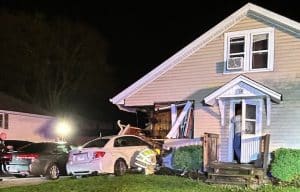Columbia talks developments and zoning
Two proposed subdivision developments were on the agenda for last Tuesday’s Columbia City Council meeting.
The first item involved a motion to approve a Community Unit Plan Type A zoning district near Eckert Lane. The plan involving single-family homes and a series of lots for senior housing had been discussed at the Feb. 3 council meeting.
Developer John Poetker of JLP Homes addressed the council before the vote about concerns expressed at the previous meeting. He said the senior housing requirement could be added to the plat, thereby allowing the city to govern the age of residents. He also addressed street width, lot size and parking concerns.
Jane Kolmer of the Tammy Mitchell Hines and Co. real estate agency also spoke to the council, advocating for senior housing in Columbia by stating that Monroe County lacks affordable options.
Despite the input, the motion to approve this CUP failed by a unanimous vote.
The other potential housing development on the agenda was brought before the council for initial discussion after being recommended for approval by the Columbia Plan Commission at its Feb. 10 meeting.
Columbia’s Director of Community Development Scott Dunakey addressed the council to inform them of changes made to the original CUP-B based on discussion during the plan commission meeting. He said developer Marty Hubbard of Southern Illinois Development, LLC, had presented a revised plan to reflect masonry requirements, reduced number of lots and other recommendations.
Residents of the Country Crossings subdivision that shares a boundary with the proposed development spoke during the meeting about traffic concerns in the area if the plan were to be approved.
Several subdivision residents expressed concern about increased traffic on Gilmore Lake Road and the potential for more vehicle accidents at the intersection with Route 3.
Resident Wendy Henke addressed the council, stating that when she moved to the subdivision, she “knew (the property near Country Crossings) would be developed eventually, so that’s not a problem. But what happens with traffic when construction begins?
“I’m glad that my daughter will be away at college when it does,” she said, adding that turning left onto Route 3 from Gilmore Lake Road is already an issue.
Columbia Mayor Kevin Hutchinson noted that as a state highway, alterations to Route 3 were not under the jurisdiction of the City of Columbia.
Bernie Toenjes, a nearby resident, asked the council about construction traffic on Hill Castle Lane, noting that one section of the road does not have an easement. He also stated he believed construction traffic posed a potential hazard at certain points because of the road’s layout.
The council then asked Dunakey questions about traffic concerns and the need for a CUP in an area already zoned for R-3 housing.
Dunakey responded by explaining “if a developer wanted to build and be 100 percent compliant with the R-3 zoning, (the city) would be obliged to approve or end up in court.”
As for traffic concerns, Dunakey pointed out a benefit of approving the CUP is an escrow account funded by the developer for future access roads, also noting that part of the revised plan excludes future use of Campbell Lane off Route 158 as an outlet.
Dunakey also noted that a traffic impact study would need to be performed for the area before construction began if the plan gains approval.
The council is scheduled to vote on this plan at its March 2 meeting.
Dunakey also addressed members of the council during a Committee of the Whole meeting Monday regarding the city’s zoning code overhaul.
He began by recommending the Columbia Plan Commission be designated as the Columbia Zoning Commission in accordance with state statutes.
Dunakey clarified it will not constitute the creation of a separate entity, but said the adoption of a new zoning code requires creation of a zoning commission.
“They will basically be doing the same thing they do now,” Dunakey said, outlining the commission’s role as a body that will review drafts and recommend approval to the council once the new zoning code is presented. Once the new code is adopted, the zoning commission designation will no longer exist.
Dunakey also asked the committee to provide direction about drafting zoning language concerning alcohol “consumption on premise” as a secondary-use allowance.
He discussed recent trends such as alcoholic beverages being served in nail salons, massage studios, event/conference centers and even laundromats.
“I think everyone can agree that restaurants are a no-brainer” when it comes to ancillary service of alcohol, Dunakey said. “I’m just looking for the council’s guidance going forward with drafting (the new zoning code).”
Hutchinson explained the recommendations were necessary to “clean up a gray area” in the code regarding businesses’ need for specific liquor licenses.
Dunakey echoed Hutchinson’s sentiment, stating that current code is “archaic” and unable to address contemporary issues.
The committee also provided direction about the treatment of zoning video gambling machines.
The committee agreed it would like to continue prohibition of video gambling in convenience stores and gas stations.
Columbia Police Chief Jerry Paul agreed with the committee, saying he would be concerned about crime in light of some of the businesses being open 24 hours and the city’s proximity to the interstate.
The committee did debate allowing video gambling at several other types of businesses but decided to let the market determine the location, noting several businesses in the area who have removed gambling machines because of lack of interest or profit.
Hutchinson said “usage determines whether or not business will keep the machines,” adding that any business wanting video gambling would have to follow established guidelines, such as holding a valid liquor license.






